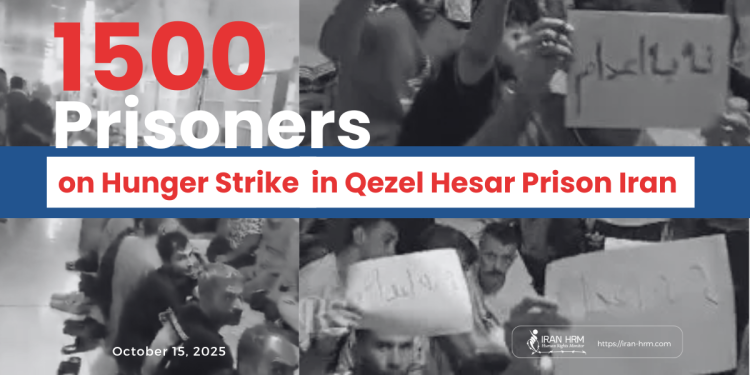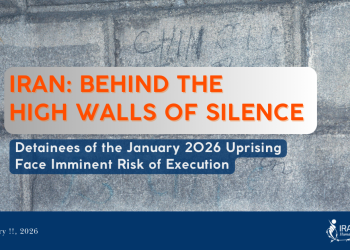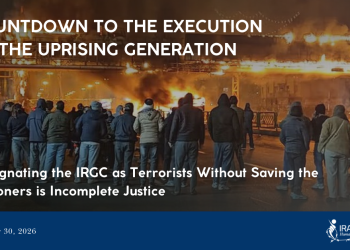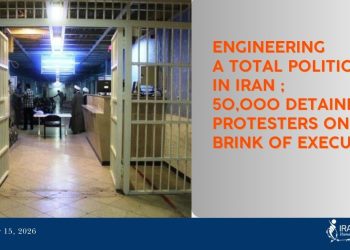1500 death-row prisoners in Qezel Hesar Prison have launched one of the largest collective hunger strikes in recent years to protest a renewed wave of executions across Iran. The strike began on Monday, October 13, when inmates in Ward 2 refused food after 11 cellmates were transferred for imminent execution; by the following day prisoners in Ward 3 and additional halls had joined, expanding the protest across Unit 2.
Inmates staged sit-ins inside prison halls and chanted “No to Execution,” while a smuggled statement from inside the prison declared: “We are also the children of this nation. The noose is around our necks, but our voices are still alive. We call on the people to be our voice and not remain silent.”
Prisoners subsequently sent a collective open letter, signed by hundreds from Wards 2 and 3, calling for nationwide solidarity and urging people to gather in front of prisons to stop the executions.
Authorities’ response and ongoing intimidation
Prison officials reportedly attempted to blunt the strike by promising a temporary suspension of executions and by summoning two representatives from each hall for talks accompanied by senior prison officials and a cleric overseeing executions. Prisoners rejected the assurances, citing years of broken promises and systematic deceit. Warden Karamollah Azizi — named in reports circulating from the prison — threatened to close the prison store and kitchen if the hunger strike continued; inmates responded that there was “nothing worse than this.”
Audio messages and other smuggled material from Qezel Hesar describe a pattern of transfers to solitary followed by rapid executions and repeated use of physical and psychological pressure to coerce confessions.
One inmate said in an audio message:
“Every time they said executions would stop, the next night our friends were taken and never returned. We will not be deceived again. If we are to die, we will die protesting, not with a rope around our necks.”
Human rights monitors and exile-based groups have documented that these methods are being used to silence prisoners protesting the regime’s execution policy.
On October 14, 2025, Qezel Hesar Prison entered the 2nd day of a mass hunger strike.
Launched by 1,500 death row prisoners from Unit 2’s Halls 1–4, the protest denounces the relentless wave of executions. #StopExecutionsInIran
When warden Karamollah Azizi threatened to close the… pic.twitter.com/akBECcYHBt— IRAN HRM (@IranHrm) October 15, 2025
Scale of executions and wider context
At least 170 prisoners were executed in the first 22 days of Mehr (early October), a pace averaging one execution every three hours. The documented surge in executions comes against a backdrop of persistent concerns about unfair trials, coerced confessions obtained under torture, and the use of the death penalty for a range of offences in proceedings that fall short of international fair-trial standards. International monitoring bodies have repeatedly urged Tehran to halt executions and allow independent scrutiny.
Legal and human-rights implications
The events at Qezel Hesar amount to a severe breach of Iran’s international obligations. The arbitrary, opaque and rapid implementation of death sentences, the use of psychological and physical coercion, and denial of basic dignity and humane treatment to prisoners violate core provisions of international law, including the International Covenant on Civil and Political Rights and recognized norms prohibiting torture and cruel, inhuman or degrading treatment. The use of hunger, deprivation and psychological pressure as tools of coercion also raises concerns that these practices amount to forms of cruel and degrading treatment.
International call to action
Iran Human Rights Monitor calls on the international community to take immediate, concrete steps:
- Immediate and public demand for a moratorium on executions by the United Nations Secretary-General, the UN Human Rights Office (OHCHR), and the UN Human Rights Council. We note the OHCHR’s prior calls for Iran to halt executions and permit independent monitoring.
- Urgent, independent access to prisons (including Qezel Hesar) for UN human-rights investigators, the International Committee of the Red Cross, and other independent monitors to verify the welfare of detainees and investigate reported abuses.
- Immediate suspension of transfers and executions of all prisoners awaiting capital punishment until fair trial standards can be guaranteed and allegations of torture and coerced confessions are impartially investigated.
- Targeted measures by the European Union and like-minded states — including visa bans and asset freezes — against officials credibly implicated in the planning and implementation of unlawful executions and torture. Such measures should be carefully targeted and accompanied by transparent criteria and due process.
Why swift international intervention matters
The hunger strike at Qezel Hesar is part of a sustained, nationwide “No to Executions” movement that weekly mobilizes prisoners across dozens of facilities to oppose the regime’s execution policy. The stakes are immediate — lives are at risk — and the wider legal and moral case for urgent action is compelling. International silence or delay risks enabling further irreversible harm.
Recommendations for NGOs, parliaments and human-rights defenders
- Monitor and amplify prisoners’ testimonies and corroborating evidence, ensuring victims’ voices remain central;
• Urge national parliaments and regional bodies to raise the issue in diplomatic fora and press for immediate UN action;
• Sponsor independent fact-finding and provide practical support to families of the condemned, including legal aid and documentation assistance;
• Coordinate rapid statements and advocacy around the hunger strike to build an urgent, visible international response.
Iran Human Rights Monitor calls on the UN, the European Union, governments, and all human-rights defenders to act now to prevent further executions and to ensure the safety and dignity of prisoners in Qezel Hesar and across Iran. The prisoners have declared: “If we are to die, we will die protesting, not with a rope around our necks.” The international community must heed that plea with concrete measures — not words alone.







